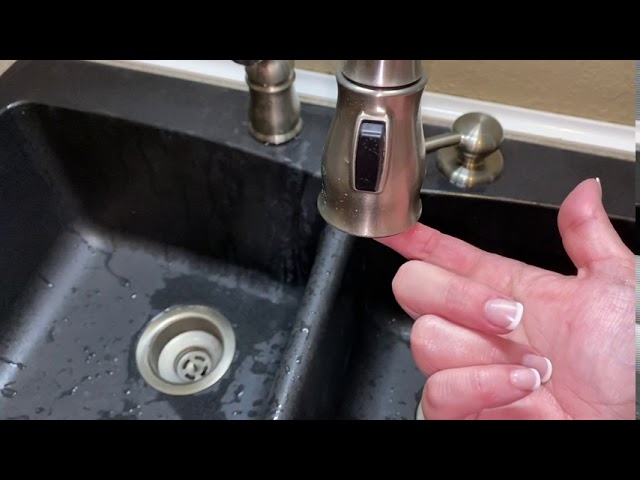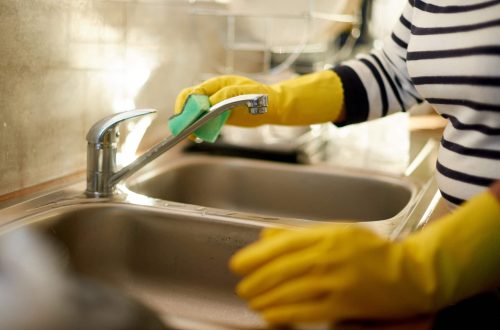Granite Sink Sparkle: How Do You Clean Granite Kitchen Sinks Like a Pro?
Understanding Your Granite Sink
Granite composite sinks are a popular choice for modern kitchens. They offer durability and a stylish look. However, proper cleaning is essential to maintain their beauty and prevent staining. Knowing the composition of your sink is the first step. Most granite sinks are actually a composite material, a blend of granite stone dust and acrylic resins. This makes them less porous than pure granite, but still susceptible to damage from harsh chemicals.
Daily Cleaning Routine
A simple daily cleaning routine can prevent buildup and stains. This is the easiest way to keep your sink looking its best. It only takes a few minutes!
- Rinse the sink thoroughly after each use.
- Use a soft sponge or cloth with mild dish soap.
- Wipe down the entire surface, paying attention to corners and edges.
- Dry the sink with a clean towel to prevent water spots.
Pro Tip: Avoid abrasive cleaners and scouring pads, as they can scratch the surface of your granite sink. Opt for gentle, non-abrasive cleaning solutions.
Deep Cleaning for Stubborn Stains
Sometimes, daily cleaning isn’t enough. Stubborn stains may require a deeper cleaning approach. Don’t worry, it’s still easy!
Baking Soda Paste
Baking soda is a natural and effective cleaner for granite sinks. It’s mildly abrasive and helps to lift stains without damaging the surface.
- Make a paste of baking soda and water.
- Apply the paste to the stained area.
- Let it sit for 15-20 minutes.
- Scrub gently with a soft brush or sponge.
- Rinse thoroughly with water.
Important: Always test any cleaning solution in an inconspicuous area first to ensure it doesn’t damage or discolor the sink.
Preventing Future Stains
Prevention is key to keeping your granite sink looking its best. Taking a few simple precautions can save you time and effort in the long run.
- Avoid leaving acidic foods or liquids (like lemon juice or vinegar) in the sink for extended periods.
- Use a sink grid or mat to protect the bottom of the sink from scratches and stains.
- Wipe up spills immediately to prevent them from setting.
- Consider applying a granite sealer periodically to protect the surface.
FAQ: Granite Sink Cleaning
Q: Can I use bleach to clean my granite sink?
A: No, bleach is not recommended for granite composite sinks. It can damage the surface and cause discoloration. Stick to mild dish soap and baking soda for cleaning.
Q: How often should I deep clean my granite sink?
A: Deep cleaning should be done as needed, depending on how frequently you use your sink and how prone it is to staining. Generally, a deep clean every 1-2 weeks is sufficient.
Q: What should I do if my granite sink has a white film on it?
A: A white film can be caused by hard water deposits. Try using a solution of equal parts water and white vinegar to remove the film. Rinse thoroughly after applying the solution.
Q: Are there any specific cleaning products designed for granite composite sinks?
A: Yes, there are several cleaning products specifically formulated for granite composite sinks. Look for products that are non-abrasive and pH-neutral. Always read the label carefully before using any cleaning product.
Granite Sink Sparkle: How Do You Clean Granite Kitchen Sinks Like a Pro?
Granite composite sinks are a popular choice for modern kitchens. They offer durability and a stylish look. However, proper cleaning is essential to maintain their beauty and prevent staining. Knowing the composition of your sink is the first step. Most granite sinks are actually a composite material, a blend of granite stone dust and acrylic resins. This makes them less porous than pure granite, but still susceptible to damage from harsh chemicals.
A simple daily cleaning routine can prevent buildup and stains. This is the easiest way to keep your sink looking its best. It only takes a few minutes!
- Rinse the sink thoroughly after each use.
- Use a soft sponge or cloth with mild dish soap.
- Wipe down the entire surface, paying attention to corners and edges.
- Dry the sink with a clean towel to prevent water spots.
Pro Tip: Avoid abrasive cleaners and scouring pads, as they can scratch the surface of your granite sink. Opt for gentle, non-abrasive cleaning solutions.
Sometimes, daily cleaning isn’t enough. Stubborn stains may require a deeper cleaning approach. Don’t worry, it’s still easy!
Baking soda is a natural and effective cleaner for granite sinks. It’s mildly abrasive and helps to lift stains without damaging the surface.
- Make a paste of baking soda and water;
- Apply the paste to the stained area.
- Let it sit for 15-20 minutes.
- Scrub gently with a soft brush or sponge.
- Rinse thoroughly with water.
Important: Always test any cleaning solution in an inconspicuous area first to ensure it doesn’t damage or discolor the sink.
Prevention is key to keeping your granite sink looking its best. Taking a few simple precautions can save you time and effort in the long run.
- Avoid leaving acidic foods or liquids (like lemon juice or vinegar) in the sink for extended periods.
- Use a sink grid or mat to protect the bottom of the sink from scratches and stains.
- Wipe up spills immediately to prevent them from setting.
- Consider applying a granite sealer periodically to protect the surface.
A: No, bleach is not recommended for granite composite sinks. It can damage the surface and cause discoloration. Stick to mild dish soap and baking soda for cleaning.
A: Deep cleaning should be done as needed, depending on how frequently you use your sink and how prone it is to staining. Generally, a deep clean every 1-2 weeks is sufficient.
A: A white film can be caused by hard water deposits. Try using a solution of equal parts water and white vinegar to remove the film. Rinse thoroughly after applying the solution.
A: Yes, there are several cleaning products specifically formulated for granite composite sinks. Look for products that are non-abrasive and pH-neutral. Always read the label carefully before using any cleaning product.
Addressing Specific Stain Types
Different types of stains necessitate tailored approaches. Understanding the nature of the stain will inform the most effective cleaning strategy. This section will address common stain types encountered in granite composite sinks and provide specific remediation techniques.
Grease and Oil Stains
Grease and oil stains often require a degreasing agent. A paste made from baking soda and a small amount of dish soap can be effective. Apply the paste, allow it to dwell for approximately 30 minutes, and then scrub gently with a soft brush. Rinse thoroughly with hot water.
Hard Water Stains
As previously mentioned, hard water stains manifest as a white film. A solution of equal parts white vinegar and water is generally sufficient for removal. For more persistent hard water stains, consider using a commercially available descaling product specifically designed for kitchen surfaces, ensuring it is compatible with granite composite materials.
Food Stains (e.g., Coffee, Tea, Berries)
Food stains, particularly those from highly pigmented substances, can be challenging. A paste of baking soda and hydrogen peroxide (3%) can be applied to the stain. Allow the paste to sit for an hour or two, monitoring for any adverse reactions. Rinse thoroughly with water. Repeat as necessary.
Caution: When using hydrogen peroxide, always wear gloves and avoid contact with eyes. Ensure adequate ventilation during application.
The Importance of Proper Drying
The final step in any cleaning process is thorough drying. Leaving water droplets on the surface of a granite composite sink can lead to water spots and mineral deposits, diminishing its aesthetic appeal. Employ a clean, dry microfiber cloth to meticulously dry the entire sink surface after each cleaning session. This simple practice will significantly contribute to maintaining the sink’s pristine condition.
Long-Term Maintenance and Protection
Beyond regular cleaning, implementing long-term maintenance strategies is crucial for preserving the integrity and appearance of your granite composite sink. This includes periodic sealing and the use of protective measures to minimize wear and tear.
Sealing
While granite composite sinks are less porous than natural granite, applying a sealant can provide an additional layer of protection against stains and water damage. Consult the manufacturer’s recommendations for the appropriate type of sealant and the frequency of application. Generally, sealing should be performed every 6-12 months.
Protective Accessories
Utilizing sink grids or mats is highly recommended to prevent scratches and impact damage from pots, pans, and other kitchen utensils. These accessories create a barrier between the sink surface and potentially damaging objects, extending the lifespan of your sink;
Troubleshooting Common Issues
Even with diligent care, certain issues may arise with granite composite sinks. This section addresses some common problems and provides practical solutions.
Dullness or Loss of Luster
Over time, the surface of a granite composite sink may lose its original luster. This can be due to the accumulation of soap scum or mineral deposits. A thorough cleaning with a mild abrasive cleaner (such as baking soda paste) followed by polishing with a microfiber cloth can often restore the sink’s shine. Consider using a granite polishing compound specifically designed for composite materials.
Scratches
While granite composite sinks are relatively scratch-resistant, they are not impervious to damage. Minor scratches can often be minimized using a scratch repair kit designed for acrylic or composite surfaces. Deeper scratches may require professional repair.






